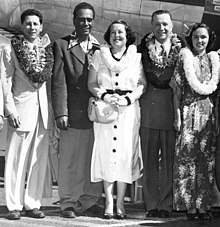Dee Duponte
Born in Augusta, Indiana, Duponte moved to the Territory of Hawaii from Kentucky and held a supervisory position at the Maui Pineapple Company for 14 years.
Her 1948 firing made her a household name on Maui after she claimed that it was motivated by her husband's campaign to be County Attorney as a Democrat, and additionally led to an upset election the same year in which the Republicans were widely defeated.
She survived a self-inflicted gunshot to her head, and was hospitalized for over a decade before her eventual death, experiencing partial paralysis.
The company denied her assertions, but they rapidly made her famous on Maui, and additionally led to public resentment of perceived "boss rule" which in turn caused an upset election the same year in which the Republicans were routed.
[5] While in the Territorial House of Representatives, Duponte became a controversial figure as a result of her opinions about who should be appointed to legislative committees as well as her criticism of conditions at Kalaupapa Settlement.
[3] In 1957, Duponte was working as director of employee training for Hawaiian Pineapple Company in addition to her position in the Territorial Senate.
Testimony in a legal case after Duponte's death regarding her will and testament suggested that the couple had been arguing and had marital issues, but intended to remarry each other within the Catholic Church.
After she was discovered lying on her bed dressed in a kimono and holding a pistol registered under her name, an ambulance rushed her to Queen's Hospital.
According to Duponte's doctor at the time, her cognition was not damaged by the gunshot wound in her brain, but she was largely paralyzed and could only move one arm slightly.
[1] A Funeral Mass was held for her at St Anthony's Church in Wailuku,[10] and her body was buried in a family plot at Kuau Cemetery.
